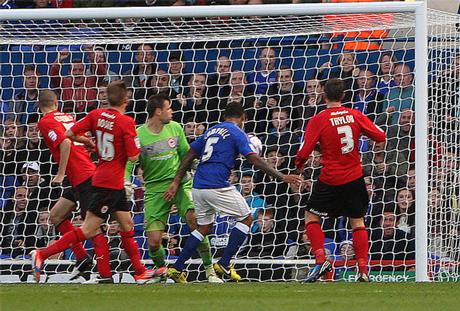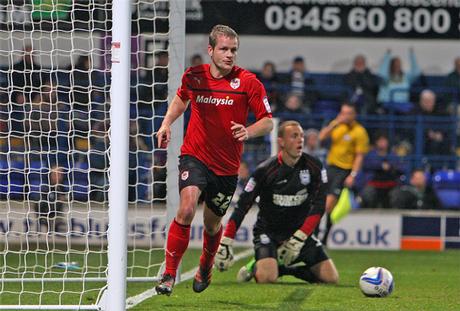My feelings were based entirely on what I had seen from his Watford side in the matches I had watched them play either in the flesh, on television or in video highlights – it seemed to me that Watford played attacking, passing football and, when they were really on form, they were too good for the Championship’s best teams. Furthermore, with his apparent readiness to give youth a chance, I had Malky Mackay down as someone who would be more prepared to utilise all of the players available to him rather than just the “old lags”, as was the case for much of Dave Jones’ time with us.
Now, after almost a season and a quarter of Malky Mackay’s reign at Cardiff City, I’ve seen enough to realise that my initial premise was wrong – Malky Mackay is not the type of manager I thought he was. While I’d still say that he is more inclined to include young players than his predecessor was, I think it’s become clear that for much of the time at Watford, he was doing it out of necessity rather than choice and he has said quite often recently that he only included youngsters at Cardiff when forced to by injuries to his small squad last season.
The first clue to Malky Mackay’s real management philosophy, as opposed to the somewhat romanticised one I’d presumed he had, came at his initial press conference at Cardiff when he was asked what type of football he preferred his sides to play. Now, someone looking to get the locals on side would probably have answered that his sides played an attacking, passing game with plenty of movement and entertainment, but, instead, our new manager’s answer was along the lines of “whatever causes the opposition the most problems” – I’d say that Malky has followed that philosophy to the letter in his time at Cardiff up to now.

D. J. Campbell punches Ipswich into the lead – in a week where Reading boss Brian McDermott was told decisions went against his team because they did not appeal against them strongly enough, did the City players’ lack of protests count against them? It’s a shocking state of affairs if it did.
There have been times when we have played the sort of high intensity, pressing and forward thinking football I saw from Watford in televised matches with Sheffield Wednesday, Portsmouth and Queens Park Rangers and in the two games against us in 2010/11, but I can only presume that Mackay’s Hornets were one of those sides who turn on the style when the cameras are there and it’s a fact that our matches with them two seasons ago came during their best run of that campaign – I’m guessing that Watford fans had to watch some turgid stuff at times during the periods between these games.
Certainly, much of what was on offer from February onwards last season was not very pleasing on the eye as Malky persisted with a 4-5-1 formation which, in my opinion, did not include enough players with real attacking instincts in the midfield five to get the seamless conversion to 4-3-3 which most versions of that system look to utilise when the team is attacking. With the lack of natural attackers in the team, we became over reliant on set pieces, but, at least we were effective from them and with us being generally efficient at keeping the opposition out from them at the other end of the pitch, this said, and still says, much about the attention to detail that must be part of the Mackay training regime at Cardiff.
With the arrival of players such as Bellamy, Kim Bo-Kyung, Smith and Noone in the summer, we now have more squad members capable of playing in midfield in a more adventurous version of 4-5-1 and, when you consider that Malky Mackay, arch pragmatist that he is, often talks about how difficult it is to play away from home in the Championship in his press conferences, I don’t find it too surprising that we have persisted with that formation in away matches, while using more of a 4-4-2 at home – what we started with at Ipswich yesterday was certainly more 4-5-1 than 4-4-2.
Whatever the formation was though, it made for hard viewing for much of the first hour at Ipswich – frankly, City were awful in possession (but, unlike Ipswich, pretty good when they didn’t have the ball) during that time with much of their basic ball control having me thinking that we were playing on one of those mud heaps that so much of the football I saw in the 60′s and 70′s took place on and not the virtual bowling greens that we see nowadays. Much was made of the fact that Ipswich’s goal should not have been allowed, but with both centrebacks and our goalkeeper (who have all been very good for most of the time this season) culpable to varying degrees, the ball should never have got to D.J. Campbell for him to punch it in anyway. Also, having hit the post and forced David Marshall into a fine save, City could have no complaints about being 1-0 down at the break when all they had managed in response was the occasional threat from dead ball situations.
With three of the four game changing new signings I mentioned earlier not in our five man midfield for one reason or another and the fourth, Craig Noone, having his least effective match, by some distance, in a Cardiff shirt, there was a season 11/12 look and feel to the team and I’ll admit that I was beginning to think that this piece would be all about how our away form had become an issue ten matches into the season. That feeling didn’t change when Craig Conway come on for Noone and Rudy Gestede started warming up, eventually replacing Joe Mason (who I’d have preferred to have seen deployed just behind lone striker Heidar Helguson with Don Cowie on the right), either – again, surely that was an over reliance on the 11/12 squad at the expense of expensive newcomers Kimbo and Etien Velikonja?
However, there was much that good about last year’s squad including a cussedness which made them hard to beat on their travels and enabled them to pick up vital wins at places like Bristol City and Barnsley despite not playing well – perhaps our manager figured that, after a couple of away defeats in which that quality was notably absent, more of the “old guard’s” spirit was needed to provide the sort of solidarity required to pick up a vital win which could see us playing a more expressive and expansive game as confidence rises and injuries subside.
Although us fans can moan and groan about Malky being “tactically inept” (i.e. not doing what we’d do if we were manager!), this is the man who gets to watch the players in action in training every day, knows more about a player’s mind set and has a much better idea of what is the true state of fitness of some of those in his squad than we’ll ever do. Presumably, the man who bases his tactical decisions on “whatever causes the opposition the most problems” had noticed that, even when they were dominant, Ipswich had not defended crosses that effectively and with Conway taking no time at all to knock in as good a cross from open play as City had produced so far, the game was changing.

I said after the Birmingham match that my main concern with Heidar Helguson was that he just didn’t look like scoring, but two typical striker’s goals last night changed all that – here he turns away after cashing in on Scott Loach’s error for our equaliser.
Shortly afterwards Heidar Helguson ended a goal drought which had lasted six games by tapping in an equaliser when keeper Scott Loach fumbled another Conway cross and this was the signal for the lanky Gestede to make his first appearance of the season. City had switched to the 4-4-2 formation that I’d say most supporters would prefer us to use, but the football purists would not have been happy that we were, pretty obviously, looking to the aerial route to win the game . Once again though, with one of Ipswich centrebacks (Danny Higginbotham) having played most of his football in a long career at full back, Malky Mackay had based his decision on what he perceived were the opposition’s weaknesses and Helguson was able to exploit a breakdown in communications between Loach and the left side of his back four to nod in the winner from five yards in the 87th minute.
I’ll hold my hand up and say that, although I’m probably more sympathetic towards Malky Mackay’s favouring of 4-5-1 in away matches than many, I find myself questioning his tactics and selections from time to time and there’s a part of me that is disappointed that he isn’t the type of manager I thought he was – that’s hardly his fault mind is it! When you look at his overall record at Cardiff though, he seems to get most things right – his style isn’t always easy on the eye, but I’d say he has proven that he can buy well on a pretty limited budget. Other managers who have made decent starts to their careers sometimes come a cropper when they are given serious sums of money to spend and it’s too early yet to tell whether Malky Mackay has spent wisely this summer (especially when it comes to his overseas acquisitions), but I’d say there are already plenty of encouraging signs as far as the likes of Noone, Smith, Connolly, Bellamy and Mutch are concerned.
After we beat Huddersfield in our first match with a display which was probably only slightly better than yesterday’s, I wrote on here that ”only time will tell if we are an ordinary side who cashed in on some good luck against Huddersfield or whether we are the real deal and have just given the first of what will be many examples of winning while playing poorly”. Based on our results and performances so far, the evidence tends to be on the side of the second of those options and, if we can continue to pick up two such wins in every ten matches we play over the course of the season, we aren’t going to be too far off automatic promotion come May. Perhaps, the real test of a manager is how often he can do something which enables his team to get wins that they maybe don’t deserve. I’d say that, although we may not always agree with the methods used, Malky Mackay often gets there in the end – yesterday being another case in point.